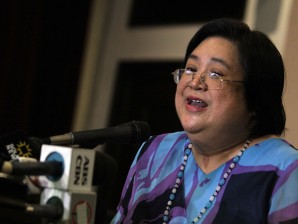With less than a month to go before the constitutional deadline for President Benigno Aquino to name the successor to ousted Chief Justice Renato Corona, the Supreme Court has set oral arguments Thursday on the contentious issue of congressional representation in the Judicial and Bar Council (JBC).
The high court has set the oral arguments for 9 a. m. on the issue “of whether Congress is entitled to one or two representatives in the JBC,” SC spokesperson Ma. Victoria Gleoresty Guerra said Tuesday.
Guerra also announced that the JBC had reset its final deliberations on the selection of the next Chief Justice from tomorrow to August 7, when the high court would be expected to resolve the matter.
She said the August 27 constitutional deadline for the President to appoint a Chief Justice was a “factor” in the decision to schedule the oral arguments in the case.
“It was a matter of public significance and involves the three great departments in government,” Guerra said.
The case stems from a petition filed in the Supreme Court by lawyer Francisco Chavez, a former solicitor general, questioning the presence of a senator and a congressman in the JBC when he said that the Constitution provided for only one representative from Congress.
The Supreme Court on July 17 upheld Chavez, ruling that the current eight-member composition of the JBC, with its two congressional representatives, was unconstitutional.
The oral arguments on Thursday will tackle two pleadings before the high court—the July 23 motion for reconsideration filed by Solicitor General Francis Jardeleza on behalf of the two congressional members in the JBC, Senator Francis Escudero and Iloilo Representative Neil Tupas Jr., and a July 25 manifestation filed by Chavez opposing the Jardeleza motion.
Congress withdraws
Senate President Juan Ponce Enrile and Speaker Feliciano Belmonte earlier announced the withdrawal of Congress from the JBC deliberations following the high court ruling upholding Chavez’s petition.
Last Monday, the Senate unanimously passed a resolution calling on the JBC to suspend its selection process until the high court shall have made a final ruling on the issue.
Guerra stressed that the high court decision to hold oral arguments tomorrow had more to do with the two pleadings before it rather than the Senate’s call for it to resolve the issue.
She said the Senate resolution still had to be officially transmitted to the high court but acknowledged that it had been “widely reported in the media.”
Senator Joker Arroyo, who earlier said that Congress’ boycott of the JBC proceedings was “tantamount to defying the Supreme Court,” yesterday received a unanimous appointment to argue the case for two congressional representatives in the high court.
Enrile said Arroyo accepted the job. “That’s a unanimous appointment. He’s the veteran lawyer that presents cases before the Supreme Court. I’m just a trial lawyer, he’s an advocate,” Enrile said.
Arroyo will obey
“I must obey,” Arroyo said after the appointment was made official by Senate Majority Leader Vicente Sotto III during Tuesday’s session.
“And I believe in the position of the Senate,” added Arroyo, who had argued for the Senate against then President Gloria Macapagal-Arroyo’s Executive Order No. 464 that invoked executive privilege and stopped members of the executive branch from attending congressional inquiries.
Asked what the Senate would do if the Supreme Court were to rule that Congress should have only one representative in the JBC, Enrile said: “Let’s see. Let us not anticipate anything.”
Belmonte said he would have to confer with Enrile and get the “consensus” of other House members on what to do.
Acting in concert
“Definitely when we get a final decision, I, representing the House, must talk to the Senate President. I will also get the consensus of the House members … we cannot be acting unilaterally on these things,” he said.
“The House and the Senate, we like to act in concert with each other, we cannot be divided,” Belmonte said.
Malacañang on Tuesday distanced itself from the Senate call for the JBC to suspend its proceedings in choosing the next Chief Justice.
“The statement of the Senate is obviously the thoughts of the institution as embodied in the resolution that they passed yesterday (Monday),” said deputy presidential spokesperson Abigail Valte.
“We will defer to the judgment of the JBC on whether they will give way to the request of the Senate,” she said.
Lawyer Jose Mejia, who represents the academe in the JBC, confirmed that the council had deferred for Monday its deliberations and preparation of a shortlist of nominees for Chief Justice to pave the way for the high court to resolve the issue on legislative representation.
Mejia said the JBC was very much aware of the constitutional deadline of August 27.
According to the Constitution, the President has to appoint a Chief Justice within 90 days of the position’s being declared vacant. Corona was removed on May 29. With reports from TJ Burgonio and Christian Esguerra
